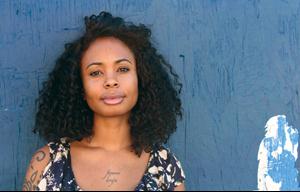“Behind every great man, you’ll find a great woman,” said laurelled athlete Meryll Frost in 1945. I’m guessing Frost was paying tribute to some patient, demure wife, happily thrusting her hubby’s questionable achievements ahead of her own while toiling away bravely in some linoleumed nightmare.
Perhaps a more apt saying would be, “In front of every great woman you’ll find a man hogging her spotlight.”
Yes, it’s fair to say that history has been less than kind to the fairer sex, relegating them, at best, to a supporting role in the shaping of the world we see today and, at worst, to complete invisibility.
“There’s this myth about women being these great collaborators,” says writer/performer Alex Tigchelaar. “As though we ever had any other fucking choice. We need to take apart this whole concept of collaborations being foisted upon us, and us making the best of that.”
It’s this deconstruction of female history that inspired Tigchelaar to create Dirty Plötz, an ensemble of female performers taking on the historical erasure and exclusion of women in art and social justice movements. It’s part of this year’s Rhubarb Festival cabaret series.
Tigchelaar says an inspiration for Dirty Plötz was Dadaist artist and poet Elsa von Freytag-Loringhoven, a woman who embraced the absurdist, avant-garde artistic movement that flourished in the early 20th century. From all accounts, Freytag-Loringhoven was gloriously eccentric and artistically prolific in her production of spoken-word pieces, as well as sculptures and paintings created out of garbage that she found in the street. Yet, little of her history and work was remembered until the 2011 publication of Body Sweats: The Uncensored Writings of Elsa von Freytag-Loringhoven.
“She was discarded and reviled by her male peers of that period,” Tigchelaar says. “She embraced the spirit of Dadaism, walking around New York in outfits made of garbage, shaving her head and painting it black or purple. She was probably quite mad to begin with, and it wasn’t helped by their disgust of her very sexual persona.”
Dirty Plötz expounds on this theme of male revulsion, with related performances by celebrated activist artists like Jess Dobkin, Keisha Scott, Zoe Whittall and Hoa Nguyen. For her segment, Tigchelaar has created a character she simply calls “The Hag.”
“I’m basing her on the sheela na gig, a fertility symbol found in Ireland [from] the pre-Puritan era, around the 1400s. It’s the image of a woman holding her vagina open, like she’s either trying to pull you in or push you out. It’s the perfect lens, looking at our history of being reviled for our sexuality and fertility.”
Another female-centric cabaret this year is Resistance & Raunch, co-created by Kim Crosby, Vivek Shraya and Mikiki. The trio has put together an ensemble of performers in reaction to what they call the “slut-shaming and sexual violence” in society today.
“We wanted to respond to the rape culture of the city,” Crosby says. “Particularly things like the comments that were made by the Toronto police officer at York University that originally spawned the SlutWalk movement and the assaults that have happened in the Annex recently.
“It’s about how we’re blamed for causing or inspiring sexual assaults, and how we’re creating a culture where people think it’s okay to do that.”
Rather than go the tut-tutting, pearl-clutching route of some commentators, Crosby and her peers are staking their own sexual ground as they redraw the lines of responsibility in sexual assault crimes.
“So often the response to sexual assault is to be prudish,” Crosby says. “But sex is a big part of who we are and who we love. You can find so much strength in creating healthy, loving relationships with sex that aren’t about shame.”
Resistance & Raunch will feature a wide variety of performances, including burlesque, spoken word and multimedia presentations.
“We wanted to include many, many different voices that weren’t being co-opted by one narrative,” Crosby says. “We have people who are sex workers, trans and queer discussing the many ways in which we fuck and we resist.”

 Why you can trust Xtra
Why you can trust Xtra


